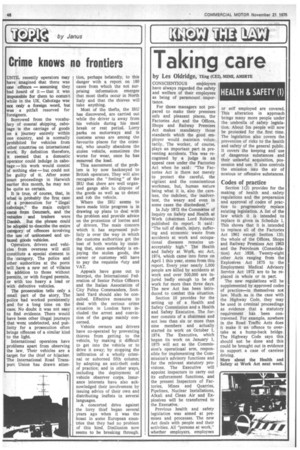Crime knows no frontiers
Page 52

If you've noticed an error in this article please click here to report it so we can fix it.
UNTIL recently operators may have imagined that there was love offence — assuring they had heard of it that it was aapossible for them to commit while in the UK. Oaubotage was not only a foreign word, but was a pitfall reserved for foreigners.
Borrowed from the vocabulary of coastal shipping, cabotage is the carriage of goods on a journey entirely within one country, and is normally prohibited for vehicles from other countries on international work. By definition therefore, it seemed that a domestic operator could indulge in cabotage —his work would consist of nothing else— but could not be guilty of it. After some court proceedings in Harwich earlier this month, he may not be mate so certain.
It is true, of course, that, in what is probably the first case of a prosecution for "illegal cabotage," the main culprit came from 'Denmark, and the vehicles and traders were Danisth. But the phrase could be adopted to describe the entire category of offiances involving the use of .urnficensed and untaxed goods vehicles.
Operators, drivers and vehicles from overseas will still constitute a special element in the category. The police and other authorities at the ports will have a new set of villains in addition to those without permits, or with forged permits, or with too heavy a load or with defective vehicles.
The prosecution tells only a small part of the story. The police had worked persistently and for a 'long time on the case. No doubt it was not easy to find evidence. There would have been other illegal journeys that went undetected, and publicity for a prosecution often brings offences of a similar kind to the light.
International operators have problems apart from observing the law. Their vehicles are a target for the thief or hijacker. The International Road Transport Union has drawn atten tion, perhaps belatedly, to this danger with a report on 180 eases from which the not surprising information emerges that most thefts occur in North Italy and that the thieves will take anything.
Most of the thefts, the IRV has discovered, are carried out while the driver is away from his vehicle during his meal break or rest period. Lorry parks on metre-ways and in customs areas are among the favourite places for the criminal, who usually abandons the stolen vehicle, sometimes the worse for wear, once he has removed the load.
This assessment of the problem is by now hackneyed to British operators. They will also recognise the " feeling " of the IRU that there are well organised gangs able to dispose of the goods as well as to detect and rob the vehicle.
Where the IRU seems to have made little progress is in drawing up plans to deal with the problem and provide advice on the protection of lorries and of drivers. The main concern which it has expressed publicly is over the way in which the customs authorities get the best of both worlds by insisting that, since somebody is enjoying the stolen goods, the owner or customer will have to pay the requisite riuty and VAT.
Appeals have gone out to Interpol, the International Federation of Senior Police Officers and the Italian Association of City Police Commanders. Scotland Yard should also be consulted. Effective measures to deal with the serious crime situation in London have included the arrest and conviction of the gangs mainly concerned.
Vehicle owners and drivers have co-operated by preventing thieves from getting to the vehicle, by making it difficult to get into the vehicle or to drive it away; by stopping the infiltration of a wholly criminal or suborned fifth column; by adopting an anti-theft code of practice; and in other ways, including the deployment of vehicle observer corps. Insurance interests have also acknowledged their involvement by issuing advice of their own and distributing leaflets in several languages.
A concerted drive against the lorry thief began several years ago when it was the boast in some European countries that they had no problem of this kind. Disillusion now seams to be breaking through.








































































































